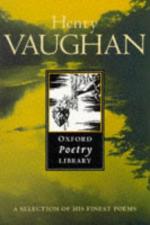|
This section contains 7,516 words (approx. 26 pages at 300 words per page) |

|
SOURCE: "The Private Imagery of Henry Vaughan," in The Review of English Studies, Vol. 1, No. 3, July, 1950, pp. 206-25.
Kermode is an English critic whose career combines modern critical methods with expert traditional scholarship, particularly in his work on Shakespeare. He characterizes all human knowledge as poetic, or fictive: constructed by humans and affected by the perceptual and emotional limitations of human consciousness. Because perceptions of life and the world change, so does human knowledge and the meaning attached to things and events. Thus, there is no single fixed reality over time. Similarly, true or "classic" literature, to Kermode, is a constantly reinterpreted living text, "complex and indeterminate enough to allow us our necessary pluralities." In the following excerpt, he examines Vaughan's uses of devotional themes in his poetry and prose to suggest that the poet's conversion, widely discussed among critics, "was rather a poetic than a religious experience...
|
This section contains 7,516 words (approx. 26 pages at 300 words per page) |

|


